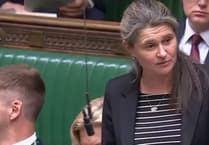A PARISH council has written to the Secretary of State for Health and Social care saying residents ‘fear that they might lose their minor injuries unit and other services at Launceston Hospital’.
The letter to Jeremy Hunt was sent by St Stephen by Launceston Rural Parish Council clerk, John Conway, on behalf of the council and stated ‘parishioners are deeply concerned about the future of our health provision with the imminent implementation of a shadow Accountable Care System in Cornwall from April 1’.
Last week, members of Cornwall Council’s Health and Adult Social Care Overview and Scrutiny Committee decided to recommend to the council’s cabinet that a new joint health and care committee is set up to test how joined up strategic commissioning for health and social care can work — known as a ‘shadow Accountable Care System’ (ACS). Members of the committee recommended to cabinet that, as this is a new way of working, there should be a transition period, described as shadow working, so that the emerging model is tested, reviewed and refined.
The NHS and local government in Cornwall and the Isles of Scilly are agreed that the way services are currently commissioned and provided will not address the changing needs of their local communities, that doing more of the same is financially unsustainable and will not guarantee that quality and safety of care will improve. Their combined view is that they need to work together as an ACS to enable more integrated care that serves the needs of the whole population.
The shadow ACS — made up of Cornwall Council, Council of the Isles of Scilly, NHS Kernow Clinical Commissioning Group (CCG) and NHS England — would operate within the existing statutory framework, which means the councils, NHS England, the CCG and NHS provider trusts will remain the statutory accountable bodies in the system.
The open letter was sent by email on February 5 with a copy also posted to Mr Hunt. The letter, which was unanimously approved by parish councillors, read: “Our parishioners are deeply concerned about the future of our health provision with the imminent implementation of a shadow Accountable Care System in Cornwall from April 1, 2018. They fear that they might lose their minor injuries unit and other services at Launceston Hospital and be required to travel long distances to access treatment. Our transport system is inadequate and our aging population will suffer great hardship and excessive cost in attempting to reach an acute hospital for care. Many will give up and die needlessly because they cannot face a long journey and they cannot afford the fares.
“Rural councils pay approximately 13% more than urban councils when commissioning social care services. Economies of scale do not work for the populations of rural counties. There is insufficient transport with few bus services. Care staff are not paid for travelling time and distance and consequently rural social care is unpopular and understaffed. Twenty per cent of rural populations are aged over 65. They do not always have access to digital connectivity. They are particularly in danger of social isolation and deprivation.
“We hear a great deal about ‘Care in the Community’ but there is no care in the community. Cornwall Council is responsible for Adult Social Care but it does not have adequate funding to fulfil its role. Elderly patients cannot be discharged from the acute hospitals (thus causing ‘bed blocking’) because there are no ‘care packages’ in place at home. Our community hospitals are the best ‘care package’ that elderly residents could have. They can convalesce after an illness in their own community with their loved ones around them. It makes no sense to close down community hospitals in rural areas nor to reduce their health services in any way. In fact, services should be increased to relieve the strain on our acute hospitals.
“If we were to lose our minor injuries unit at Launceston Hospital, our growing population would be in a sorry plight. People’s lives would be put at risk. This cannot be considered policy for any government in a civilised society.
“Our community in the east of rural Cornwall would ask you to consider their need for the continuing expansion of their community hospital and their minor injuries unit to safeguard the health of our residents. We understand your arguments for health care hubs and centres of medical excellence but these worthy institutions are of no use to residents who cannot access them. We need local care to serve local needs. In some cases, we agree that we shall need to travel to have the use of specialist equipment and treatment but these should be the exceptions and not the rule. Please consider our elderly and frail population, which needs local care and health amenities.
“Having paid our National Insurance contributions and general taxation to pay for our National Health Service all our working lives, we now require its services in our community hospitals. The Government should meet its responsibilities and we ask you to address our concerns.”
An NHS Kernow CCG spokesperson added: “We acknowledge the concerns raised by parishioners in their letter to the Secretary of State for Health and Social Care Jeremy Hunt.
"Discussions are ongoing between all local health and care organisations who are working together and talking to colleagues in Devon around an integrated care system. These discussions are focused on ensuring care is joined up, and as close to home as possible reflecting that a proportion of the population in Cornwall and the Isles of Scilly live in rural areas.
"Absolutely no decisions have been made about the future number or location of community services.
"We will continue to consider how all of our services fit into our Shaping Our Future vision to create a seamless health and care system that provides the best clinical outcomes and value for money, based on people’s needs and the money we have available to spend. Once the detail of the service model is clear we can then look to see what infrastructure is required to support this
"We are still in the process of working with clinicians, people working in social care, volunteers, councillors and people who use our services on the re-design of our health and care system. The third round of our co-production workshops begins this month to help develop our plans.”





Comments
This article has no comments yet. Be the first to leave a comment.